
CALIFORNIA FISH AND GAME
Scope & Guideline
Championing Biodiversity and Ecological Insight
Introduction
Aims and Scopes
- Wildlife Conservation and Management:
The journal emphasizes research that contributes to the understanding and management of California's wildlife, including species at risk, their habitats, and the ecological dynamics affecting their populations. - Ecological Research:
It publishes studies that explore ecological interactions and variations in species behavior, populations, and habitats, contributing to the broader field of ecology. - Human-Wildlife Interactions:
Research addressing the impacts of human activities on wildlife and strategies to mitigate conflicts, such as studies on human disturbances to coastal wildlife and innovative wildlife protection measures. - Endangered Species Research:
The journal focuses on the conservation status and management strategies for endangered and threatened species, providing crucial data for their protection and recovery. - Habitat Assessment and Restoration:
Research related to habitat suitability, restoration efforts, and conservation planning, aimed at maintaining and improving the ecological integrity of California's environments.
Trending and Emerging
- Climate Change Impacts on Wildlife:
There is an increasing focus on how climate change affects wildlife populations and habitats, highlighting the urgent need for adaptive management strategies in conservation efforts. - Renewable Energy and Its Effects on Wildlife:
Research exploring the intersection of renewable energy projects, such as solar farms, and their implications for local wildlife is gaining traction, emphasizing the need for sustainable development practices. - Collaborative Conservation Efforts:
Emerging themes include collaborative efforts among various stakeholders to address wildlife protection, indicating a trend towards inclusive and community-based conservation approaches. - Adaptive Management Case Studies:
There is a growing trend in publishing case studies that examine adaptive management practices, providing insights into effective strategies for wildlife conservation in changing environments. - Species-Specific Conservation Strategies:
An increased emphasis is seen on developing and implementing strategies tailored to specific species, particularly those that are endangered, reflecting a more focused approach to conservation.
Declining or Waning
- Historical Ecological Studies:
There appears to be a waning interest in historical ecological studies that focus on past conditions of ecosystems without directly linking to current conservation strategies or management practices. - General Faunal Surveys:
While faunal surveys are important, the trend indicates a decrease in publications emphasizing broad surveys without specific management implications, possibly due to a shift towards targeted conservation efforts. - Invasive Species Research:
Research focused on invasive species, while still important, has become less prominent in recent issues, potentially due to the increasing focus on conservation of native species and ecosystems.
Similar Journals
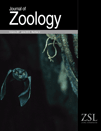
JOURNAL OF ZOOLOGY
Advancing knowledge in animal biology and ecology.JOURNAL OF ZOOLOGY, published by Wiley, stands as a premier scholarly journal in the fields of Animal Science and Zoology, renowned for its outstanding contributions to the knowledge of animal biology and ecology. With an impressive impact factor and a strong ranking in the Q1 category for Animal Science and Zoology, as well as Q2 for Ecology, Evolution, Behavior, and Systematics, the journal rigorously engages with both foundational research and groundbreaking discoveries since its inception in 1830. Located in Hoboken, New Jersey, this journal is dedicated to fostering the academic community's understanding of zoological sciences, providing access to important research that shapes wildlife conservation efforts and ecological studies. Although the journal does not currently offer open access options, it continues to attract significant attention, as evidenced by its strong Scopus rankings in related categories. Researchers, professionals, and students will find invaluable resources in the JOURNAL OF ZOOLOGY to advance their understanding of animal life and the ecological challenges it faces today.
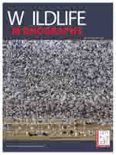
WILDLIFE MONOGRAPHS
Fostering understanding to protect our natural heritage.WILDLIFE MONOGRAPHS, published by WILEY, is a prestigious journal dedicated to advancing the understanding of ecological and biological sciences with a keen focus on wildlife conservation and management. With an ISSN of 0084-0173 and an E-ISSN of 1938-5455, this journal has established itself as a leader in its field, ranking in the Q1 quartile for both Ecology, Evolution, Behavior and Systematics and Nature and Landscape Conservation in 2023. The journal's remarkable impact is underscored by its Scopus rankings—46th out of 721 in Agricultural and Biological Sciences and 17th out of 211 in Environmental Science, highlighting the journal's influential role in shaping research discussions and policy in wildlife management. Available in print and online, WILDLIFE MONOGRAPHS publishes comprehensive studies that inform practitioners, researchers, and students alike, fostering a deeper insight into biodiversity and ecosystem dynamics. Founded in 1981, the journal continues to evolve, contributing significantly to the scientific community through rigorous peer-reviewed articles that bridge the gap between theory and practical application in wildlife management.

CANADIAN JOURNAL OF ZOOLOGY
Unveiling Nature's Mysteries Through ResearchWelcome to the Canadian Journal of Zoology, a leading academic journal in the fields of Animal Science and Zoology as well as Ecology, Evolution, Behavior and Systematics. Published by Canadian Science Publishing since 1965, this esteemed journal serves as a vital platform for researchers, professionals, and students to disseminate and engage with significant findings in zoological and ecological research. With an impact factor placing it in the Q2 category and rankings reflecting its influence (201/490 in Animal Science and Zoology; 372/721 in Ecology), the journal is committed to advancing the understanding of animal biology and environmental interactions. Although currently not an open access publication, it provides comprehensive resources and studies that are crucial for the academic community. Based in Ottawa, Canada, the journal continues to push the boundary of knowledge right up to 2024 and beyond, making it an essential resource for anyone dedicated to the life sciences.
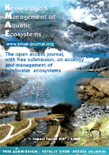
Knowledge and Management of Aquatic Ecosystems
Empowering Research for a Sustainable Water WorldKnowledge and Management of Aquatic Ecosystems, published by EDP SCIENCES S A, is a premier open-access journal dedicated to the interdisciplinary study of aquatic ecosystems. With an ISSN of 1961-9502 and an impressive history since 1928, this journal serves as a vital resource for researchers and professionals in the fields of Ecology, Aquatic Science, Water Science and Technology, and Nature Conservation. The journal has consistently achieved high rankings, including a Q2 classification in multiple categories, which underscores its significant contribution to the evolving landscape of aquatic research. With access options that promote widespread dissemination of knowledge, Knowledge and Management of Aquatic Ecosystems aims to bridge gaps in research, policy, and practical applications, making it an invaluable asset for students, researchers, and policymakers aiming for impactful solutions in aquatic management and conservation.
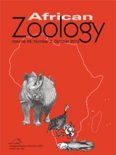
AFRICAN ZOOLOGY
Fostering Insights into Ecosystem DynamicsAFRICAN ZOOLOGY, published by Taylor & Francis Ltd, stands as a significant journal in the realm of Animal Science and Zoology, with a proud history dating back to 1996 and slated to continue until 2024. With an ISSN of 1562-7020 and E-ISSN 2224-073X, this journal provides a reputable platform for researchers and practitioners dedicated to the study of animal biology across the African continent. It has been recognized for its quality scholarship, evidenced by its Q3 categorization in the 2023 Scopus quartile rankings and an impressive rank of #182 out of 490 within its field. As an open-access journal, it facilitates the dissemination of vital research findings and promotes broader accessibility, catering to a diverse audience of professionals, scholars, and students alike. The journal aims to enhance our understanding of wildlife, conservation, and ecosystem dynamics in Africa, fostering collaborations that address critical ecological challenges. For researchers and enthusiasts keen on contributing to and staying informed about advancements in zoological science, AFRICAN ZOOLOGY is an essential resource that enriches the global discourse on biodiversity and conservation efforts.

EUROPEAN JOURNAL OF WILDLIFE RESEARCH
Decoding wildlife behavior to enhance conservation efforts.European Journal of Wildlife Research, published by SPRINGER, is a key academic resource in the fields of ecology, evolution, behavior, and systematics, as well as management, monitoring, policy, and law related to wildlife conservation. With an impressive Q2 categorization among its peers, this journal serves as a vital platform for interdisciplinary research, fostering dialogue among researchers, conservationists, and policymakers. The journal focuses on innovative studies that delve into wildlife ecology, population dynamics, and species management, contributing significantly to our understanding and preservation of biodiversity in various landscapes. Although its coverage in Scopus ended in 2003, the journal's heritage is deeply rooted in the field, dating back to its inception in 1955, and continues to influence contemporary research practices. As an open-access journal, it allows for broad dissemination of knowledge, ensuring that vital findings reach a global audience, making it a valuable reference for students, professionals, and academics committed to wildlife research.

California Fish and Wildlife Journal
Connecting Science and Policy for a Greener FutureCalifornia Fish and Wildlife Journal, published by the California Department of Fish and Wildlife, is a pivotal platform dedicated to advancing the understanding of fish and wildlife management and conservation. As an open access journal, it fosters collaboration and knowledge sharing among researchers, practitioners, and students interested in aquatic and terrestrial ecosystems. With a focus on empirical research, policy implications, and innovative conservation strategies, the journal plays a crucial role in informing both scientific communities and decision-makers alike. Researchers seeking to contribute to critical discussions on sustainability, habitat preservation, and biodiversity will find this journal an essential resource. The journal’s commitment to disseminating knowledge about California's rich natural resources enhances its stature in the field of wildlife management and conservation studies.

GULF AND CARIBBEAN RESEARCH
Diving into the Future of OceanographyGulf and Caribbean Research is an esteemed academic journal published by the University of Southern Mississippi, dedicated to advancing the understanding of aquatic ecosystems in the Gulf of Mexico and the Caribbean region. With an ISSN of 1528-0470 and an E-ISSN of 2572-1410, the journal serves as an essential platform for researchers and professionals in the fields of Aquatic Science, Oceanography, and Water Science and Technology, recognized in the 2023 Q3 Quartile rankings across these disciplines. The journal welcomes diverse contributions including original research, reviews, and technical notes, encouraging interdisciplinary approaches to address ecological and environmental challenges within its scope. Despite the absence of an open access option, it provides invaluable insights, evidenced by its Scopus rankings, which position it within the 31st to 33rd percentile across various related categories. The engaging research articulated in Gulf and Caribbean Research fosters dialogue and collaboration, making it a vital resource for those committed to scientific discovery and conservation efforts in these critical aquatic environments.

Journal of Fish and Wildlife Management
Advancing conservation through innovative research.The Journal of Fish and Wildlife Management, published by the U.S. Fish & Wildlife Service, serves as a vital resource for scholars, researchers, and professionals in the fields of Animal Science, Ecology, and Conservation Biology. With its ISSN 1944-687X, this esteemed journal has been disseminating critical research findings since 2010, contributing significantly to the understanding of fish and wildlife conservation practices and their ecological impacts. Despite its Q3 category rankings in various disciplines as of 2023, it provides a platform for innovative research that influences policy and management strategies for biodiversity conservation. The journal, although not open access, remains committed to advancing the scientific discourse surrounding wildlife management with articles that emphasize practical conservation efforts and ecological sustainability. Readers can expect a diverse range of articles that promote best practices in the management and conservation of fish and wildlife resources, furthering our collective mission of preserving ecological health and biodiversity for future generations.
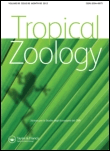
TROPICAL ZOOLOGY
Advancing the frontiers of tropical wildlife research.TROPICAL ZOOLOGY is a prestigious academic journal dedicated to advancing knowledge and research in the fields of animal science, zoology, and ecology. Published by PAGEPRESS PUBL, this journal has been an integral part of the scientific community since its inception in 1988, providing a platform for the dissemination of innovative research and discoveries related to tropical wildlife and ecosystems. With an impact factor placing it in the Q3 category for both Animal Science and Zoology, as well as Ecology, Evolution, Behavior, and Systematics, it ranks among the noteworthy publications in these fields. Researchers, professionals, and students will find that TROPICAL ZOOLOGY is an essential resource for the latest findings, fostering a deeper understanding of biodiversity and conservation in tropical environments. The journal is based in the United Kingdom, with additional administrative support from MEDIGROUP in Italy, ensuring a broad international perspective and reach. While it does not operate under an open access model, it remains committed to high-quality peer-reviewed content that contributes significantly to the understanding of tropical ecosystems and the species that inhabit them.